- Home
- Alice Munro
Alice Munro's Best Page 6
Alice Munro's Best Read online
Page 6
There was a young man with a book on his lap, books on the floor, papers all around him. Rose asked him if he had seen anybody run past. He said no.
She told him what had happened. She didn’t tell him because she was frightened or disgusted, as he seemed afterward to think, but just because she had to tell somebody; it was so odd. She was not prepared at all for his response. His long neck and face turned red, the flush entirely absorbing a birthmark down the side of his cheek. He was thin and fair. He stood up without any thought for the book in his lap or the papers in front of him. The book thumped on the floor. A great sheaf of papers, pushed across the desk, upset his ink bottle.
“How vile,” he said.
“Grab the ink,” Rose said. He leaned to catch the bottle and knocked it onto the floor. Fortunately the top was on, and it did not break.
“Did he hurt you?”
“No, not really.”
“Come on upstairs. We’ll report it.”
“Oh, no.”
“He can’t get away with that. It shouldn’t be allowed.”
“There isn’t anybody to report to,” Rose said with relief. “The librarian goes off at noon on Saturdays.”
“It’s disgusting,” he said in a high-pitched, excitable voice. Rose was sorry now that she had told him anything, and said she had to get back to work.
“Are you really all right?”
“Oh, yes.”
“I’ll be right here. Just call me if he comes back.”
That was Patrick. If she had been trying to make him fall in love with her, there was no better way she could have chosen. He had many chivalric notions, which he pretended to mock, by saying certain words and phrases as if in quotation marks. “The fair sex,” he would say, and “damsel in distress.” Coming to his carrel with that story, Rose had turned herself into a damsel in distress. The pretended irony would not fool anybody; it was clear that he did wish to operate in a world of knights and ladies; outrages; devotions.
She continued to see him in the library, every Saturday, and often she met him walking across the campus or in the cafeteria. He made a point of greeting her with courtesy and concern, saying, “How are you?” in a way that suggested she might have suffered a further attack, or might still be recovering from the first one. He always flushed deeply when he saw her, and she thought that this was because the memory of what she had told him so embarrassed him. Later she found out it was because he was in love.
He discovered her name, and where she lived. He phoned her at Dr. Henshawe’s house and asked her to go to the movies. At first when he said, “This is Patrick Blatchford speaking,” Rose could not think who it was, but after a moment she recognized the high, rather aggrieved and tremulous voice. She said she would go. This was partly because Dr. Henshawe was always saying she was glad Rose did not waste her time running around with boys.
Rather soon after she started to go out with him, she said to Patrick, “Wouldn’t it be funny if it was you who grabbed my leg that day in the library?”
He did not think it would be funny. He was horrified that she would think such a thing.
She said she was only joking. She said she meant that it would be a good twist in a story, maybe a Maugham story, or a Hitchcock movie. They had just been to see a Hitchcock movie.
“You know, if Hitchcock made a movie out of something like that, you could be a wild insatiable leg-grabber with one half of your personality, and the other half could be a timid scholar.”
He didn’t like that either.
“Is that how I seem to you, a timid scholar?” It seemed to her he deepened his voice, introduced a few growling notes, drew in his chin, as if for a joke. But he seldom joked with her; he didn’t think joking was suitable when you were in love.
“I didn’t say you were a timid scholar or a leg-grabber. It was just an idea.”
After a while he said, “I suppose I don’t seem very manly.”
She was startled and irritated by such an exposure. He took such chances; had nothing ever taught him not to take such chances? But maybe he didn’t, after all. He knew she would have to say something reassuring. Though she was hoping not to, she longed to say judiciously, “Well, no. You don’t.”
But that would not actually be true. He did seem masculine to her. Because he took those chances. Only a man could be so careless and demanding.
“We come from two different worlds,” she said to him, on another occasion. She felt like a character in a play, saying that. “My people are poor people. You would think the place I lived in was a dump.”
Now she was the one who was being dishonest, pretending to throw herself on his mercy, for of course she did not expect him to say, “Oh, well, if you come from poor people and live in a dump, then I will have to withdraw my offer.”
“But I’m glad,” said Patrick. “I’m glad you’re poor. You’re so lovely. You’re like the Beggar Maid.”
“Who?”
“‘King Cophetua and the Beggar Maid.’ You know. The painting. Don’t you know that painting?”
Patrick had a trick – no, it was not a trick, Patrick had no tricks – Patrick had a way of expressing surprise, fairly scornful surprise, when people did not know something he knew, and similar scorn, similar surprise, whenever they had bothered to know something he did not. His arrogance and humility were both oddly exaggerated. The arrogance, Rose decided in time, must come from being rich, though Patrick was never arrogant about that in itself. His sisters, when she met them, turned out to be the same way, disgusted with anybody who did not know about horses or sailing, and just as disgusted by anybody knowing about music, say, or politics. Patrick and they could do little together but radiate disgust. But wasn’t Billy Pope as bad, wasn’t Flo as bad, when it came to arrogance? Maybe. There was a difference, though, and the difference was that Billy Pope and Flo were not protected. Things could get at them: D.P.’s; people speaking French on the radio; changes. Patrick and his sisters behaved as if things could never get at them. Their voices, when they quarrelled at the table, were astonishingly childish; their demands for food they liked, their petulance at seeing anything on the table they didn’t like, were those of children. They had never had to defer and polish themselves and win favor in the world, they never would have to, and that was because they were rich.
Rose had no idea at the beginning how rich Patrick was. Nobody believed that. Everybody believed she had been calculating and clever, and she was so far from clever, in that way, that she really did not mind if they believed it. It turned out that other girls had been trying, and had not struck, as she had, the necessary note. Older girls, sorority girls, who had never noticed her before began to look at her with puzzlement and respect. Even Dr. Henshawe, when she saw that things were more serious than she had supposed, and settled Rose down to have a talk about it, assumed that she would have an eye on the money.
“It is no small triumph to attract the attentions of the heir to a mercantile empire,” said Dr. Henshawe, being ironic and serious at the same time. “I don’t despise wealth,” she said. “Sometimes I wish I had some of it.” (Did she really suppose she had not?) “I am sure you will learn how to put it to good uses. But what about your ambitions, Rose? What about your studies and your degree? Are you going to forget all that so soon?”
“Mercantile empire” was a rather grand way of putting it. Patrick’s family owned a chain of department stores in British Columbia. All Patrick had said to Rose was that his father owned some stores. When she said two different worlds to him she was thinking that he probably lived in some substantial house like the houses in Dr. Henshawe’s neighborhood. She was thinking of the most prosperous merchants in Hanratty. She could not realize what a coup she had made because it would have been a coup for her if the butcher’s son had fallen for her, or the jeweller’s; people would say she had done well.
She had a look at that painting. She looked it up in an art book in the library. She studied the Beggar Maid, meek an
d voluptuous, with her shy white feet. The milky surrender of her, the helplessness and gratitude. Was that how Patrick saw Rose? Was that how she could be? She would need that king, sharp and swarthy as he looked, even in his trance of passion, clever and barbaric. He could make a puddle of her, with his fierce desire. There would be no apologizing with him, none of that flinching, that lack of faith, that seemed to be revealed in all transactions with Patrick.
She could not turn Patrick down. She could not do it. It was not the amount of money but the amount of love he offered that she could not ignore; she believed that she felt sorry for him, that she had to help him out. It was as if he had come up to her in a crowd carrying a large, simple, dazzling object – a huge egg, maybe, of solid silver, something of doubtful use and punishing weight – and was offering it to her, in fact thrusting it at her, begging her to take some of the weight of it off him. If she thrust it back, how could he bear it? But that explanation left something out. It left out her own appetite, which was not for wealth but for worship. The size, the weight, the shine, of what he said was love (and she did not doubt him) had to impress her, even though she had never asked for it. It did not seem likely such an offering would come her way again. Patrick himself, though worshipful, did in some oblique way acknowledge her luck.
She had always thought this would happen, that somebody would look at her and love her totally and helplessly. At the same time she had thought that nobody would, nobody would want her at all, and up until now nobody had. What made you wanted was nothing you did, it was something you had, and how could you ever tell whether you had it? She would look at herself in the glass and think: Wife, sweetheart. Those mild lovely words. How could they apply to her? It was a miracle; it was a mistake. It was what she had dreamed of; it was not what she wanted.
She grew very tired, irritable, sleepless. She tried to think admiringly of Patrick. His lean, fair-skinned face was really very handsome. He must know a number of things. He graded papers, presided at examinations, he was finishing his thesis. There was a smell of pipe tobacco and rough wool about him that she liked. He was twenty-four. No other girl she knew who had a boyfriend had one as old as that.
Then without warning she thought of him saying, “I suppose I don’t seem very manly.” She thought of him saying, “Do you love me? Do you really love me?” He would look at her in a scared and threatening way. Then when she said yes he said how lucky he was, how lucky they were; he mentioned friends of his and their girls, comparing their love affairs unfavorably to his and Rose’s. Rose would shiver with irritation and misery. She was sick of herself as much as him, she was sick of the picture they made at this moment, walking across a snowy downtown park, her bare hand snuggled in Patrick’s, in his pocket. Some outrageous and cruel things were being shouted inside her. She had to do something, to keep them from getting out. She started tickling and teasing him.
Outside Dr. Henshawe’s back door, in the snow, she kissed him, tried to make him open his mouth, she did scandalous things to him. When he kissed her his lips were soft; his tongue was shy; he collapsed over rather than held her, she could not find any force in him.
“You’re lovely. You have lovely skin. Such fair eyebrows. You’re so delicate.”
She was pleased to hear that, anybody would be. But she said warningly, “I’m not so delicate, really. I’m quite large.”
“You don’t know how I love you. There’s a book I have called The White Goddess. Every time I look at the title it reminds me of you.”
She wriggled away from him. She bent down and got a handful of snow from the drift by the steps and clapped it on his head.
“My White God.”
He shook the snow out. She scooped up some more and threw it at him. He didn’t laugh; he was surprised and alarmed. She brushed the snow off his eyebrows and licked it off his ears. She was laughing, though she felt desperate rather than merry. She didn’t know what made her do this.
“Dr. Hen-shawe,” Patrick hissed at her. The tender poetic voice he used for rhapsodizing about her could entirely disappear, could change to remonstrance, exasperation, with no steps at all between.
“Dr. Henshawe will hear you!”
“Dr. Henshawe says you are an honorable young man,” Rose said dreamily. “I think she’s in love with you.” It was true; Dr. Henshawe had said that. And it was true that he was. He couldn’t bear the way Rose was talking. She blew at the snow in his hair. “Why don’t you go in and deflower her? I’m sure she’s a virgin. That’s her window. Why don’t you?” She rubbed his hair, then slipped her hand inside his overcoat and rubbed the front of his pants. “You’re hard!” she said triumphantly. “Oh, Patrick! You’ve got a hard-on for Dr. Henshawe!” She had never said anything like this before, never come near behaving like this.
“Shut up!” said Patrick, tormented. But she couldn’t. She raised her head and in a loud whisper pretended to call toward an upstairs window, “Dr. Henshawe! Come and see what Patrick’s got for you!” Her bullying hand went for his fly.
To stop her, to keep her quiet, Patrick had to struggle with her. He got a hand over her mouth, with the other hand beat her away from his zipper. The big loose sleeves of his overcoat beat at her like floppy wings. As soon as he started to fight she was relieved – that was what she wanted from him, some sort of action. But she had to keep resisting, until he really proved himself stronger. She was afraid he might not be able to.
But he was. He forced her down, down, to her knees, face down in the snow. He pulled her arms back and rubbed her face in the snow. Then he let her go, and almost spoiled it.
“Are you all right? Are you? I’m sorry. Rose?”
She staggered up and shoved her snowy face into his. He backed off.
“Kiss me! Kiss the snow! I love you!”
“Do you?” he said plaintively, and brushed the snow from a corner of her mouth and kissed her, with understandable bewilderment. “Do you?”
Then the light came on, flooding them and the trampled snow, and Dr. Henshawe was calling over their heads.
“Rose! Rose!”
She called in a patient, encouraging voice, as if Rose was lost in a fog nearby, and needed directing home.
“DO YOU LOVE HIM, Rose?” said Dr. Henshawe. “No, think about it. Do you?” Her voice was full of doubt and seriousness. Rose took a deep breath and answered as if filled with calm emotion, “Yes, I do.”
“Well, then.”
In the middle of the night Rose woke up and ate chocolate bars. She craved sweets. Often in class or in the middle of a movie she started thinking about fudge cupcakes, brownies, some kind of cake Dr. Henshawe bought at the European Bakery; it was filled with dollops of rich bitter chocolate that ran out on the plate. Whenever she tried to think about herself and Patrick, whenever she made up her mind to decide what she really felt, these cravings intervened.
She was putting on weight, and had developed a nest of pimples between her eyebrows.
Her bedroom was cold, being over the garage, with windows on three sides. Otherwise it was pleasant. Over the bed hung framed photographs of Greek skies and ruins, taken by Dr. Henshawe herself on her Mediterranean trip.
She was writing an essay on Yeats’s plays. In one of the plays a young bride is lured away by the fairies from her sensible unbearable marriage.
“Come away, O human child …” Rose read, and her eyes filled up with tears for herself, as if she was that shy elusive virgin, too fine for the bewildered peasants who have entrapped her. In actual fact she was the peasant, shocking high-minded Patrick, but he did not look for escape.
She took down one of those Greek photographs and defaced the wallpaper, writing the start of a poem which had come to her while she ate chocolate bars in bed and the wind from Gibbons Park banged at the garage walls.
Heedless in my dark womb
I bear a madman’s child …
She never wrote any more if it, and wondered sometimes if she had meant headless. She never
tried to rub it out, either.
PATRICK SHARED AN apartment with two other graduate students. He lived plainly, did not own a car or belong to a fraternity. His clothes had an ordinary academic shabbiness. His friends were the sons of teachers and ministers. He said his father had all but disowned him for becoming an intellectual. He said he would never go into business.
They came back to the apartment in the early afternoon when they knew both the other students would be out. The apartment was cold. They undressed quickly and got into Patrick’s bed. Now was the time. They clung together, shivering and giggling. Rose was doing the giggling. She felt a need to be continually playful. She was terrified that they would not manage it, that there was a great humiliation in store, a great exposure of their poor deceits and stratagems. But the deceits and stratagems were only hers. Patrick was never a fraud; he managed, in spite of gigantic embarrassment, apologies; he passed through some amazed pantings and flounderings, to peace. Rose was no help, presenting instead of an honest passivity much twisting and fluttering eagerness, unpracticed counterfeit of passion. She was pleased when it was accomplished; she did not have to counterfeit that. They had done what others did, they had done what lovers did. She thought of celebration. What occurred to her was something delicious to eat, a sundae at Boomers, apple pie with hot cinnamon sauce. She was not at all prepared for Patrick’s idea, which was to stay where they were and try again.
When pleasure presented itself, the fifth or sixth time they were together, she was thrown out of gear entirely, her passionate carrying-on was silenced.
Patrick said, “What’s the matter?”
“Nothing!” Rose said, turning herself radiant and attentive once more. But she kept forgetting, the new developments interfered, and she had finally to give in to that struggle, more or less ignoring Patrick. When she could take note of him again she overwhelmed him with gratitude; she was really grateful now, and she wanted to be forgiven, though she could not say so, for all her pretended gratitude, her patronizing, her doubts.

 Runaway
Runaway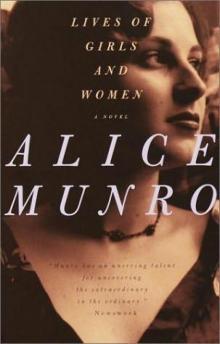 Lives of Girls and Women
Lives of Girls and Women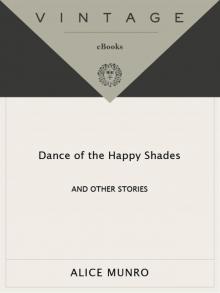 Dance of the Happy Shades
Dance of the Happy Shades Open Secrets
Open Secrets Julieta (Movie Tie-in Edition)
Julieta (Movie Tie-in Edition)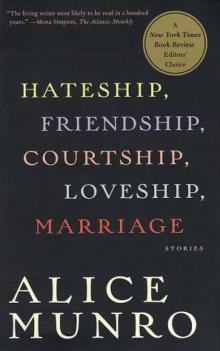 Hateship, Friendship, Courtship, Loveship, Marriage: Stories
Hateship, Friendship, Courtship, Loveship, Marriage: Stories Alice Munro's Best
Alice Munro's Best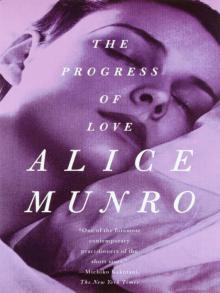 The Progress of Love
The Progress of Love Selected Stories
Selected Stories Away from Her
Away from Her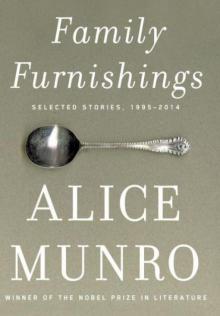 Family Furnishings
Family Furnishings Moons of Jupiter
Moons of Jupiter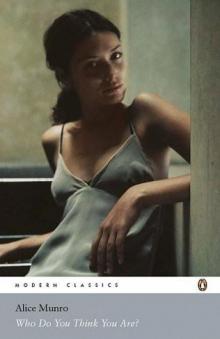 Who Do You Think You Are?
Who Do You Think You Are?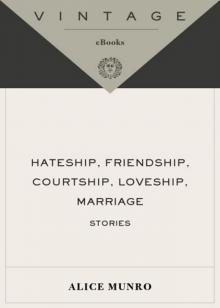 Hateship, Friendship, Courtship, Loveship, Marriage
Hateship, Friendship, Courtship, Loveship, Marriage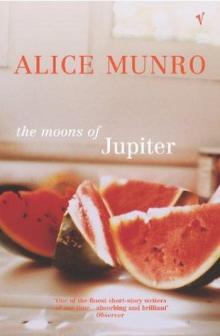 The Moons of Jupiter
The Moons of Jupiter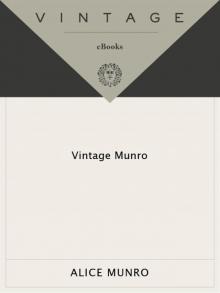 Vintage Munro
Vintage Munro The Love of a Good Woman
The Love of a Good Woman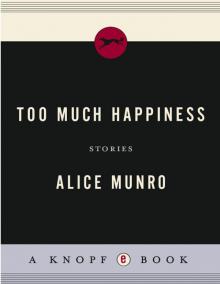 Too Much Happiness
Too Much Happiness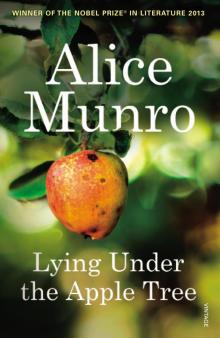 Lying Under the Apple Tree
Lying Under the Apple Tree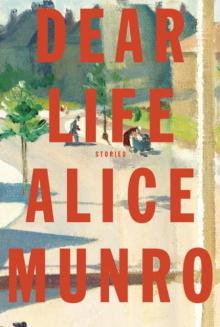 Dear Life
Dear Life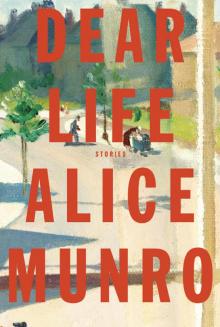 Dear Life: Stories
Dear Life: Stories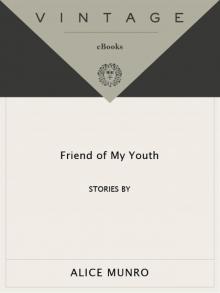 Friend of My Youth
Friend of My Youth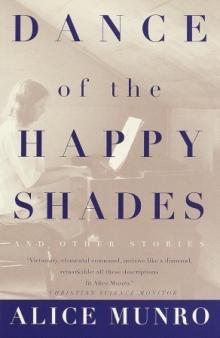 Dance of the Happy Shades: And Other Stories
Dance of the Happy Shades: And Other Stories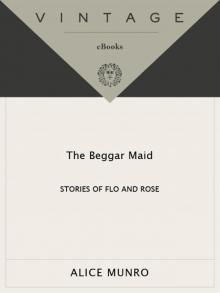 The Beggar Maid
The Beggar Maid